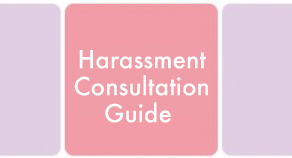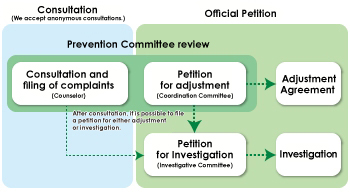Anti-harassment Initiatives

Harassment is not tolerated at KUAS

KUAS takes a strict stance against harassment, and has a zero-tolerance policy toward harassing behavior that interferes with the learning environment of our students or the work environment of our faculty and staff. KUAS will pursue any issues or questions related to harassment in earnest, and students who have concerns should contact the representatives below.
KUAS Initiatives
Harassment is an act that violates a person’s human rights. Under KUAS’ stated objective of learning and growing together, all faculty, staff, and students have a responsibility to prevent acts that unjustly violate the dignity of others.
In order to eliminate and prevent harassment and other acts and ensure a positive learning and work environment for students, faculty and staff, KUAS has established Harassment Prevention Regulations, created a Harassment Prevention Committee within the university, and assigned counselors to act as points of contact, and have a system in place to respond appropriately to any problems that may arise.
Resolution Process

Prevention Committee
The Prevention Committee prepares guidelines, conducts awareness-raising activities, and handles all issues related to harassment, including consultation, receipt of complaints, and relief for victims.
Counselors (and Support Desk Staff)
Students, faculty, and staff can learn how to contact the counselors and support desk through the Counseling Guide, the university website, and the university bulletin board. Consultation can be received by the individual, but also by a proxy or friend, or by such a person accompanied by the person himself/herself.
Coordination Committee
This committee is called to session whenever a counselor files a formal “petition for adjustment” with the university. The Coordination Committee will interview both parties individually, compare their testimony, and strive to resolve the problem through discussion while giving due consideration to privacy.
Investigative Committee
The investigative committee is called to session to resolve cases where the counselor directly requests certain measures such as disciplinary action against the offending party, or where one or both parties request certain measures after the coordination committee has attempted negotiation but has failed.
What constitutes harassment?
Harassment is anything that harms the dignity of another person, disrupts the learning environment of students, or obstructs the duties of the faculty and staff. Harassment can come in the following forms.
Sexual Harassment
Sexual harassment is defined by using one’s position in education, research, or work to say or do anything of a sexual nature that is against another person’s will, and depending on that person’s reaction, imparting advantages or disadvantages with regard to their education, research, grading/accreditation, employment, wages, etc.
Sexual harassment also refers to causing someone to feel humiliation, mental anguish, or discomfort through sexually explicit remarks or sexual behavior that is against their will, thereby disrupting their learning, research or work environment.
Academic Harassment
Academic harassment is defined as using one’s position in an educational or research-related environment to harm those under one’s tutelage through inappropriate words or actions.
Power Harassment
Power harassment refers to taking advantage of one’s position in the workplace to cause disadvantage to one’s subordinates or colleagues through inappropriate words or actions.
Other forms of harassment
Repeatedly engaging in inappropriate actions or using inappropriate words against the will of another person in the workplace or at school, creating an unpleasant environment that harms the other party’s or dignity as an individual and causes great disadvantage to them as a student, teacher, or employee.
Scope of application
The KUAS Harassment Prevention Regulations apply to all faculty, staff (regardless of their work status, such as full-time, part-time, temporary, etc), students (undergraduate, graduate, international students, researchers, non-degree students, auditing students, etc), and persons who belong to organizations that have a relationship with the university (such as the guardians’ associations and alumni association).
Cases that constitute harassment
Sexual harassment
Specific examples*
- Asking a student out for dinner or a date for reasons such as approving their credits for a course
- Forcing someone to sit next to you and drink at a party
- Making sexual demands of someone
- Touching someone intentionally
- Unnecessary one-on-one tutoring
- Stalking
- Harassing phone calls, letters or emails.
- Posting documents or images of a sexual nature.
- Staring unnecessarily
- Sexist comments
- Obscene jokes
- Starting sexual rumors
- Commenting on someone’s looks
- Abusive comments or actions based on sexual orientation, gender identity, or gender expression.
Sexual harassment is frequently perpetrated by men against women, but it can also be perpetrated by women against men, or between people of the same sex. In addition, sexual harassment generally occurs in a hierarchical relationship, i.e., between faculty members and students, supervisors and subordinates, or seniors and juniors, but it can also occur between colleagues, classmates, or faculty members.
Academic Harassment
Specific examples
- Refusing to provide guidance to a student without good reason
- Harsh reprimands and dignity-denying verbal abuse that go beyond the scope of common sense
- Unfair or inequitable treatment of students in regard to degree or credit approval
- Disallowing the use of literature or equipment necessary for research
Power Harassment
Specific examples
- Injuring someone’s dignity beyond the scope of normal work-related instruction
- Interfere with someone’s promotions, advancements, etc.
- Deliberately not communicating information that is necessary for the job
- Demanding tasks of an unreasonable amount or content
- Ignoring, isolating, or discrediting someone
Other types of harassment
Specific examples
- Spreading rumors about private matters, making it difficult for someone to engage in professional or academic activities
- Repeated use of demeaning language, name-calling, and slander, making it difficult for someone to engage in professional or academic activities
To avoid perpetrating harassment and prevent it from happening
Please be aware that there are gender and individual differences in the way words and actions are perceived. For example, words and actions that are meant to be friendly may cause discomfort to the other person as unpleasant sexual behavior. It is important to always be considerate of the other person’s feelings, and not to judge whether or not this constitutes harassment based on your own selfish assumptions. If you find that the other person does not like what you are saying or doing, stop immediately and do not repeat it.
Also, the other person may not always be able to clearly express their rejection. Be very careful not to make the mistake of assuming that the other person agrees.
If you are experiencing harassment, please consult with us!
Blaming yourself or being patient will not make the situation better. Please consult with a counselor in a way that is convenient for you.
This can be done in person, by letter, phone, or e-mail.
Counselors
Two counselors from each faculty and three counselors from the administrative staff are appointed by the President. Counselor appointments are announced on the university’s website and on the campus bulletin board.
List of harassment counselors for 2024
All counselors will maintain confidentiality and work to resolve any issues.
【Faculty Counselors】
| Name | Affiliation |
|---|---|
| Tsutomu Yamashita | Faculty of Economics and Business Administration |
| Naoko Nagasawa | Faculty of Economics and Business Administration |
| Yuko Takeuchi | Faculty of Humanities |
| Yu Odanaka | Faculty of Humanities |
| Yasuyo Fujii | Faculty of Bioenvironmental Science |
| Yoshihisa Yano | Faculty of Bioenvironmental Science |
| Akiko Yabuki | Faculty of Health and Medical Sciences |
| Wataru Kimura | Faculty of Health and Medical Sciences |
| Alberto Castellazzi | Faculty of Engineering |
| LIANG Zilu | Faculty of Engineering |
【Staff Counselors】
| Name | Affiliation |
|---|---|
| Takamasa Inagaki | Public Relations Center |
| Eriko Yoshitani | Educational Affairs Center |
| Sara Shimada | International Center |
For telephone consultation, please contact the Harassment Consultation Office (075-406-9108).
If you wish to contact the counselors by e-mail, please write to the address below. The email will be sent to the two representative counselors. Representative counselors will be announced on the campus bulletin board.
soudan@kuas.ac.jp
【Contact by Mail】
Please send to the following address
〒615-8577 18, Gotanda-cho, Yamanouchi, Ukyo-ku, Kyoto City
To: KUAS General Affairs Division
Harassment Prevention Committee
Your privacy will be strictly protected
All faculty and staff that handle harassment cases are obligated to respect the privacy of those involved and to maintain the confidentiality of all matters known in their capacity. In the event of a violation, appropriate disciplinary action will be taken in accordance with the university and staff regulations. Your right to seek consultation or to testify against harassment is protected.




